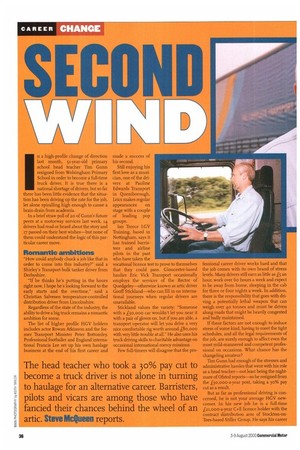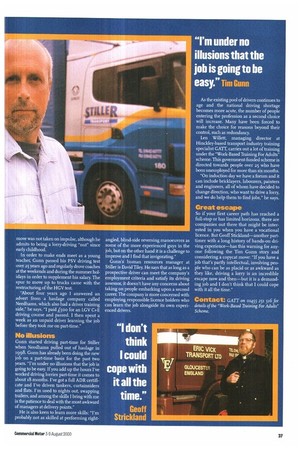n a high-profile change of direction last month, 51 -year-old primary
Page 38

Page 39

If you've noticed an error in this article please click here to report it so we can fix it.
school head teacher Tim Gunn resigned from Wolsingham Primary School in order to become a full-time truck driver. It is true there is a national shortage of drivers, but so far there has been little evidence that the situation has been driving up the rate for the job, let alone spiralling high enough to cause a brain drain from academia.
In a brief straw poll of 2 o of Gunn's future peers at a motorway services last week, 14 drivers had read or heard about the story and 17 passed on their best wishes—but none of them could understand the logic of this particular career move.
Romantic ambitions
"How could anybody chuck a job like that in order to come into this industry?" said a Shirley's Transport bulk tanker driver from Derbyshire.
If he thinks he's putting in the hours right now, I hope he's looking forward to the early starts and the overtime," said a hristian Salvesen temperature-controlled . 'stribution driver from Lincolnshire.
Regardless of the state of the industry, the . bility to drive a big truck remains a romantic bition for some.
' The list of higher profile HGV holders „ chides actor Rowan Atkinson and the forer Transport Minister Peter Bottomley. . ofessional footballer and England intema'onal Francis Lee set up his own haulage usiness at the end of his first career and made a success of his second.
Still enjoying his first love as a musician, one of the drivers at Pauline Edwards Transport in Queniborough, Leics makes regular
appearances on stage with a couple of leading pop groups.
Ian Treece LGV Training, based in Nottingham, says it has trained barristers and airline pilots in the past who have taken the vocational licence test to prove to themselves that they could pass. Gloucester-based haulier Eric Vick Transport occasionally employs the services of the Rector of Quedgeley—otherwise known as artic driver Geoff Stickland—who can fill in on international journeys when regular drivers are unavailable.
Stickland values the variety: "Someone with a £30,000 car wouldn't let you near it with a pair of gloves on, but if you are able, a transport operator will let you drive a very nice comfortable rig worth around £80,00c) with very little trouble at all." He also uses his truck driving skills to charitable advantage on occasional international mercy missions.
Few full-timers will disagree that the pro fessional career driver works hard and that the job comes with its own brand of stress levels. Many drivers still earn as little as £5 an hour, work over Go hours a week and expect to be away from home, sleeping in the cab for three or four nights a week. In addition, there is the responsibility that goes with driving a potentially lethal weapon that can weigh over 40 tonnes and must be driven along roads that might be heavily congested and badly maintained.
If these factors are not enough to induce stress of some kind, having to meet the tight schedules, and all the legal requirements of the job, are surely enough to affect even the most mild-mannered and competent professional on occasions. What chance has the changeling amateur?
Tim Gunn had enough of the stresses and administrative hassles that went with his role as a head teacher—not least being the nightmare of Ofsted reports—so he resigned from the £30,000-a-year post, taking a 30% pay cut as a result.
But as far as professional driving is concerned, he is not your average LIGV newcomer. In his new job he is a full-time £21,00 o-a-year C+E licence holder with the contract distribution arm of Stockton-onTees-based Stiller Group. He says his career move was not taken on impulse, although he admits to being a lorry-driving "nut" since early childhood.
In order to make ends meet as a young teacher, Gunn passed his PSV driving test over 25 years ago and regularly drove coaches at the weekends and during the summer holidays in order to supplement his salary. The spur to move up to trucks came with the restructuring of the HGV test.
"About four years ago I answered an advert from a haulage company called Needhams, which also had a driver training side," he says. "I paid £500 for an LGV C+E driving course and passed. I then spent a week as an unpaid driver learning the job before they took me on part-time."
No illusions
Gunn started driving part-time for Stiller when Needhams pulled out of haulage in 1998. Gunn has already been doing the new job on a part-time basis for the past two years. "I'm under no illusions that the job is going to be easy. If you add up the hours I've worked driving lorries part-time it comes to about 18 months. I've got a full ADR certificate and I've driven tankers, curtainsiders and flats. I'm used to nights out, swapping trailers, and among the skills I bring with me is the patience to deal with the most awkward of managers at delivery points."
He is also keen to learn more skills: "I'm probably not as skilled at performing right angled, blind-side reversing manoeuvres as some of the more experienced guys in the job, but on the other hand it is a challenge to improve and I find that invigorating?'
Gunn's human resources manager at Stiller is David Tiley. He says that as long as a prospective driver can meet the company's employment criteria and satisfy its driving assessor, it doesn't have any concerns about taking on people embarking upon a second career. The company is more concerned with employing responsible licence holders who can learn the job alongside its own experienced drivers. As the existing pool of drivers continues to age and the national driving shortage becomes more acute, the number of people entering the profession as a second choice will increase. Many have been forced to make the choice for reasons beyond their control, such as redundancy.
Len Willett, managing director at Hincldey-based transport industry training specialist GATT, carries out a lot of training under the "Work-Based Training For Adults" scheme. This government-funded scheme is directed towards people over 25 who have been unemployed for more than six months.
"On induction day we have a forum and it can include bricklayers, labourers, painters and engineers, all of whom have decided to change direction, who want to drive a lorry, and we do help them to find jobs," he says.
Great escape
So if your first career path has reached a full-stop or has limited horizons, there are companies out there that might be interested in you when you have a vocational licence. But Geoff Stickland—another parttimer with a long history of hands-on driving experience—has this warning for anyone following the Tim Gunn story and considering a copycat move: "If you have a job that's partly intellectual, involving people who can be as placid or as awkward as they like, driving a lorry is an incredible escape now and then—but it is a demanding job and I don't think that I could cope with it all the time."
Contact: GAIT on 0455 251 516 for details of the "Work-Based Training For Adults" Scheme.




































































































